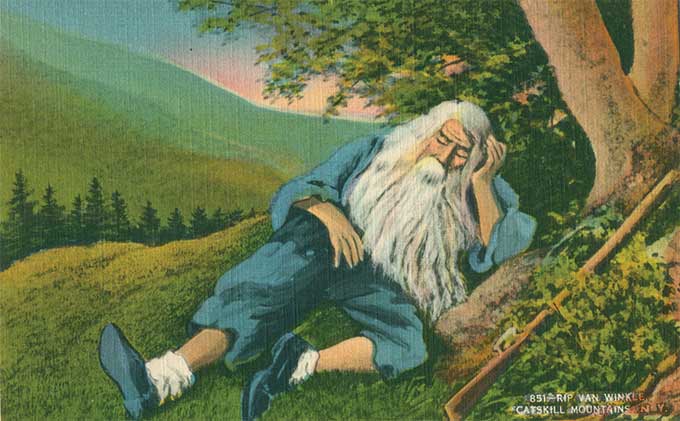Words by Molly Openshaw
Recently, I read Washington Irving’s 1819 short story and was very surprised by the portrayal of women. Irving displays women as unspoken heroes, demonstrating a refreshing portrayal of women in nineteenth-century literature. Rip Van Winkle is the tale of a lazy husband going missing for twenty years, when he returns America has split from the British empire, his wife is dead and his surroundings have changed drastically. Throughout the story, Irving’s two female characters (the wife, Dame Van Winkle, and the daughter, Judith) are both silent throughout the story, yet remain the saviours of the story. The fact that women do not have a speaking role in this short story whilst also being fairly dominant and feared characters who end up becoming the heroines of the tale shows that women were simultaneously domestic and dominant whilst remaining voiceless. I think that Irving demonstrates a feminist attitude here, showing the power of women and their importance to society.
Despite the women initially being displayed as nuisances, they are also shown to be powerful, essential and dominant. Dame Van Winkle is only praised for her homemaking skills after Rip realises that his home has been demolished in her absence. As Rip returns from his twenty-year wander in the wilderness, he explains that “Dame Van Winkle has always kept [the house] in neat order”. This is the only positive description of his wife with him otherwise describing her as a “shrew”.
After the Dame’s death, Rip is homeless, heroically, his daughter Judith is happy to take in her father who abandoned her family. Again, Rip is only pleased to have a tidy house and to be able to avoid work and responsibilities, he is only interested in his own gain and there is no mention of any of his daughter’s characteristics or interests. Here women are not characters with rich personalities or talents, only a method of giving men comfort and even then, they are scrutinized for nagging and demanding work from their idle husband or father.
Carolyn Karcher, a literary critic, supports this idea that Rip is immature and idle, refusing to take responsibility for anything or anyone. Judith, luckily for Rip, appears “ready to assume the care of his wayward, overgrown infant”. This argument suggests that despite Rip being gone for twenty years, he has not matured and he is still not taking any responsibility for his actions or for his role in society. We can see here that women are playing a heroic role in the story of Rip Van Winkle because once again a woman enables Rip to maintain his laziness. The structure of the short story highlights this point further, suggesting that Rip’s grandchild is again avoiding responsibilities while the women are still presented as domestic, nagging and voiceless characters.
Not only are the female characters represented as heroic in this story, but they are also presented as dominant, tyrannical and fierce, all while being voiceless and marginalised. Rip is described to question “what courage can withstand the ever-during and all-besetting terrors of a woman’s tongue”. Through this, the Dame is depicted as the more dominant character in their household, showing how women were presented as more powerful, despite this being presented as a negative trait for women to have. This may be a nuanced way of Irving presenting the changing attitudes in America during the revolution as the monarchy was no longer required. It could also be seen as Irving’s attitudes towards women, critiquing society for being negative towards powerful women.
This representation of women in Rip Van Winkle is unusual for a representation of women in Nineteenth-Century America. This is because at the time in which this is set in a household a man was required “to take forceful measures to ensure the uninterrupted functioning of his home”. In the household, the man was usually the dominant character with the woman being responsible for being subservient and maintaining the house. The fact that the Dame was taking on both the domestic role and the dominant role in the household adds to this idea that Rip was superfluous, especially as the town he lived in went through a revolution in his absence. This may be a nuanced way of Irving presenting the changing attitudes in America during the revolution as the monarchy was no longer required.
With the portrayal of powerful women being seen as nuisances in this short story, countered with their key role played in the narrative, I think we can see this short story as feminist. Irving moulds these powerful women as instrumental to the story, showing how essential their work is to the survival and achievements of men. Despite women being portrayed as negative, as we are seeing the women through Rip’s eyes, it is apparent that we are meant to criticise Rip’s attitudes, thus seeing women as the unspoken heroes of Rip Van Winkle.

